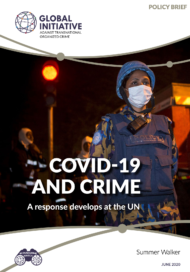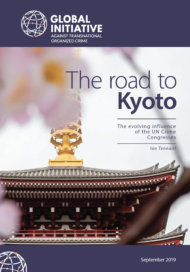Posted on 03 Jun 2020
During the pandemic, the dynamics of illicit markets have been evident, as we have analyzed in other publications of our COVID Crime Watch series. Cybercrime activities have expanded as lives move deeper online; criminal groups have enforced quarantine patrol and delivered groceries to communities affected by lockdown measures; and, in one theory, the illicit pangolin trade may have caused the viral transfer that has now become a global crisis.
Recognizing that this crisis is first and foremost a health and humanitarian emergency, it has exposed a number of governance failures and risks, including in public services, economic protection and rule of law. The UN is also faced with these challenges, which include the way crime and corruption feed off emergencies, hinder responses and impede prospects for an inclusive economic recovery.
This brief looks at the UN response to the crime and corruption aspects of the pandemic, and lays out several key crosscutting areas that will be critical for the institution to address as it leads a global effort to fight the pandemic and promote a recovery in line with Agenda 2030.




